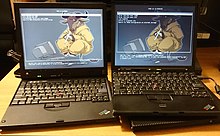Libreboot
 | |
 Two ThinkPad X60 laptops modified to use Libreboot as their firmware | |
| Original author(s) | Leah Rowe[1] |
|---|---|
| Initial release | 12 December 2013 |
| Preview release | 20241008 (October 8, 2024) [±][2] |
| Repository | |
| Written in | Mostly C, and about 1% in assembly[citation needed] |
| Platform | IA-32, x86-64, ARMv7[3] |
| Type | Firmware |
| License | GPL version 3[4] |
| Website | libreboot |
Libreboot (formerly known as GNU Libreboot[5]) is a free software project aimed at replacing the proprietary BIOS firmware found in most computers with a libre, lightweight system designed to perform only the minimum number of tasks necessary to load and run a modern 32-bit or 64-bit operating system.
Libreboot was established as a distribution of coreboot without proprietary binary blobs.[6][7] Libreboot is not a straight fork of coreboot; instead, it is a parallel effort that works closely with and re-bases every so often on the latest coreboot as the upstream supplier, with patches merged upstream whenever possible. In addition to removing proprietary software, libreboot also attempts to make coreboot easy to use by automating the build and installation processes.[8][9]
The Libreboot project made possible the required modifications for completely libre variants of some ThinkPad, Chromebook, and MacBook laptops as well as desktop and server and workstation motherboards.[10][11] According to its own documentation, it can work with any Linux distribution that uses kernel mode setting (KMS) for the graphics, while Windows is not supported and its use is discouraged by Libreboot.[12]
The Free Software Foundation (FSF) endorses Libreboot,[13] and it officially became part of the GNU Project on 14 May 2016.[14] However, on 16 September 2016, Libreboot's head developer Leah Rowe announced a boycott of the FSF and the removal of Libreboot from the GNU Project, in response to allegations that the organization had fired a transgender employee because the employee reported gender harassment.[15] The FSF publicly denied these allegations on 16 September 2016.[16] Rowe further objected to the FSF not 'letting Libreboot go' on 23 September 2016.[17] Libreboot contributor Damien Zammit issued a statement alleging that Leah Rowe decided to separate from GNU unilaterally, and advertises her personal views as the views of the Libreboot community without consulting other contributors.[18] Other than Rowe and Zammit, no other Libreboot contributor has publicly expressed a desire to either leave GNU or stay with it.
Supported systems
Libreboot system support includes the following systems:[11][19][20]
- Server boards: Asus KFSN4-DRE and Asus KGPE-D16
- Desktop boards: Asus KCMA-D8, Intel D510MO, Gigabyte GA-G41M-ES2L, and Apple iMac 5,2
- Laptops: Asus Chromebook C201, Lenovo ThinkPad X60/X60s, Lenovo ThinkPad X60 Tablet, Lenovo ThinkPad T60 (some exceptions), Lenovo ThinkPad X200, Lenovo ThinkPad R400, Lenovo ThinkPad T400, Lenovo ThinkPad T500, Apple MacBook 1.1, and Apple MacBook 2.1
References
- ^ "Libreboot project contributors". libreboot.org. Retrieved 14 May 2016.
- ^ "Libreboot - Libreboot news". Libreboot. Retrieved 29 April 2024.
- ^ "Coreboot ARM". coreboot. 15 October 2013. Retrieved 1 February 2014.
- ^ "libreboot's COPYING file". notabug.org/vimuser/libreboot/. Retrieved 16 September 2016.
- ^ "GNU Libreboot". Retrieved 24 May 2016.
- ^ "Libreboot". Free Software Foundation. Retrieved 31 July 2014.
- ^ "Libreboot". Libreboot. Retrieved 31 July 2014.
- ^ "About the libreboot project". Libreboot. Retrieved 25 April 2015.
- ^ "Replace your proprietary BIOS with Libreboot". Free Software Foundation. 4 August 2014.
- ^ Gay, Joshua (9 October 2012). "Respects Your Freedom hardware product certification". Free Software Foundation. Retrieved 25 February 2015.
- ^ a b "Hardware compatibility list". Libreboot. Retrieved 19 May 2016.
- ^ "Answers to Frequently Asked Questions about libreboot". Libreboot.org.
- ^ "Campaign for Free BIOS — Free Software Foundation — working together for free software". fsf.org. Retrieved 15 October 2015.
- ^ "Libreboot, Coreboot Downstream, Becomes A GNU Project". Phoronix. 19 May 2016. Retrieved 19 May 2016.
- ^ "Libreboot opposes the Free Software Foundation and GNU project". Libreboot. Retrieved 22 September 2016.
- ^ "Free Software Foundation statement on 2016-09-16 — Free Software Foundation — working together for free software". www.fsf.org. Retrieved 24 September 2016.
- ^ "Richard Stallman and GNU refused to let libreboot go, despite stating its intention to leave". Libreboot.org. Retrieved 24 September 2016.
- ^ Zammit, Damien (18 September 2016). "Libreboot Screwup". zammit.org. Retrieved 31 October 2016.
[the contributors] are not consulted about any of the views expressed on the libreboot.org website when they are hastily published by Leah.
- ^ Larabel, Michael (28 June 2015). "Libreboot Now Supports An AMD/ASUS Motherboard". Phoronix. Retrieved 14 July 2015.
- ^ Brad Linder. "Libreboot ported to Asus Chromebook C201 (free software bootloader)". Liliputing. Retrieved 15 October 2015.
